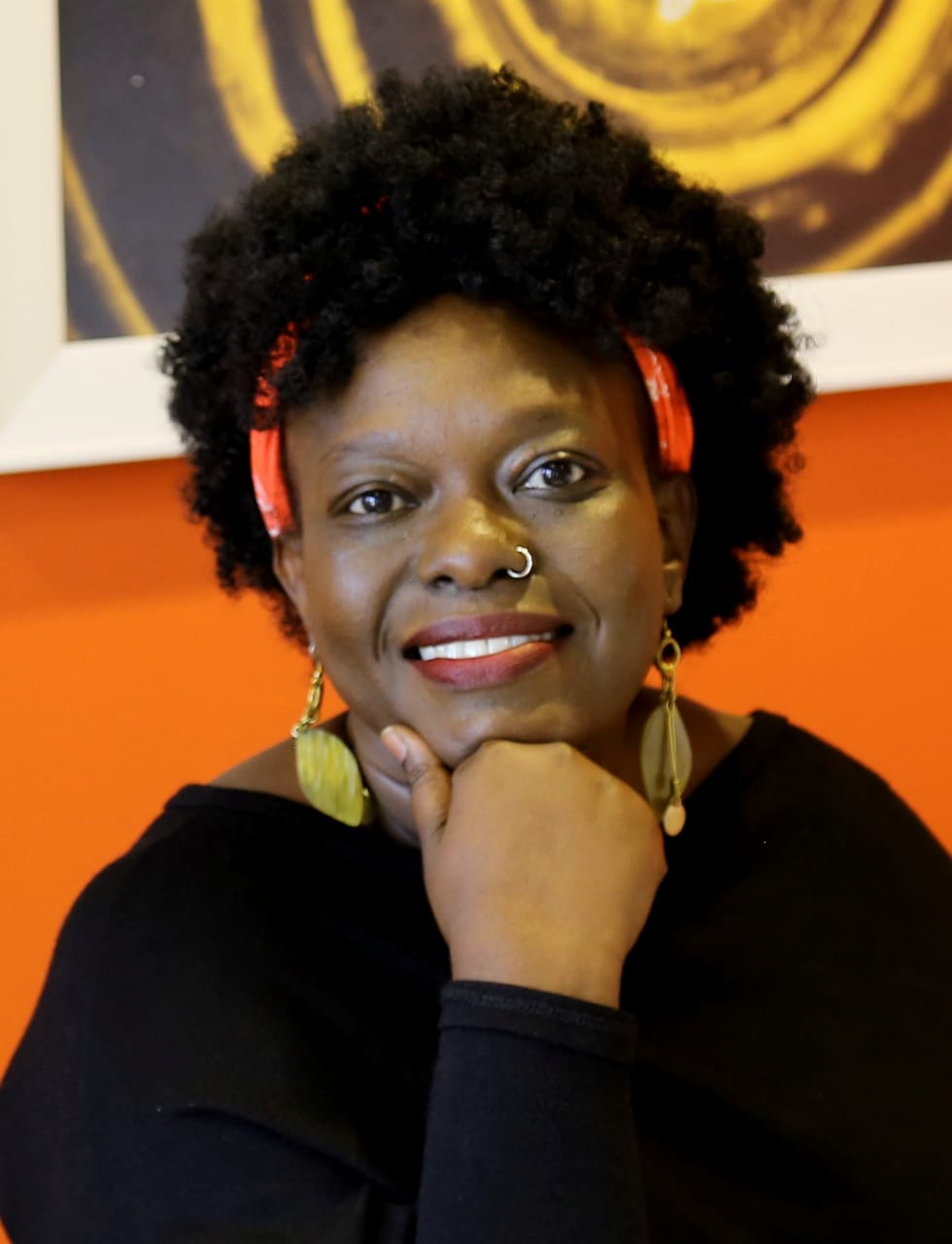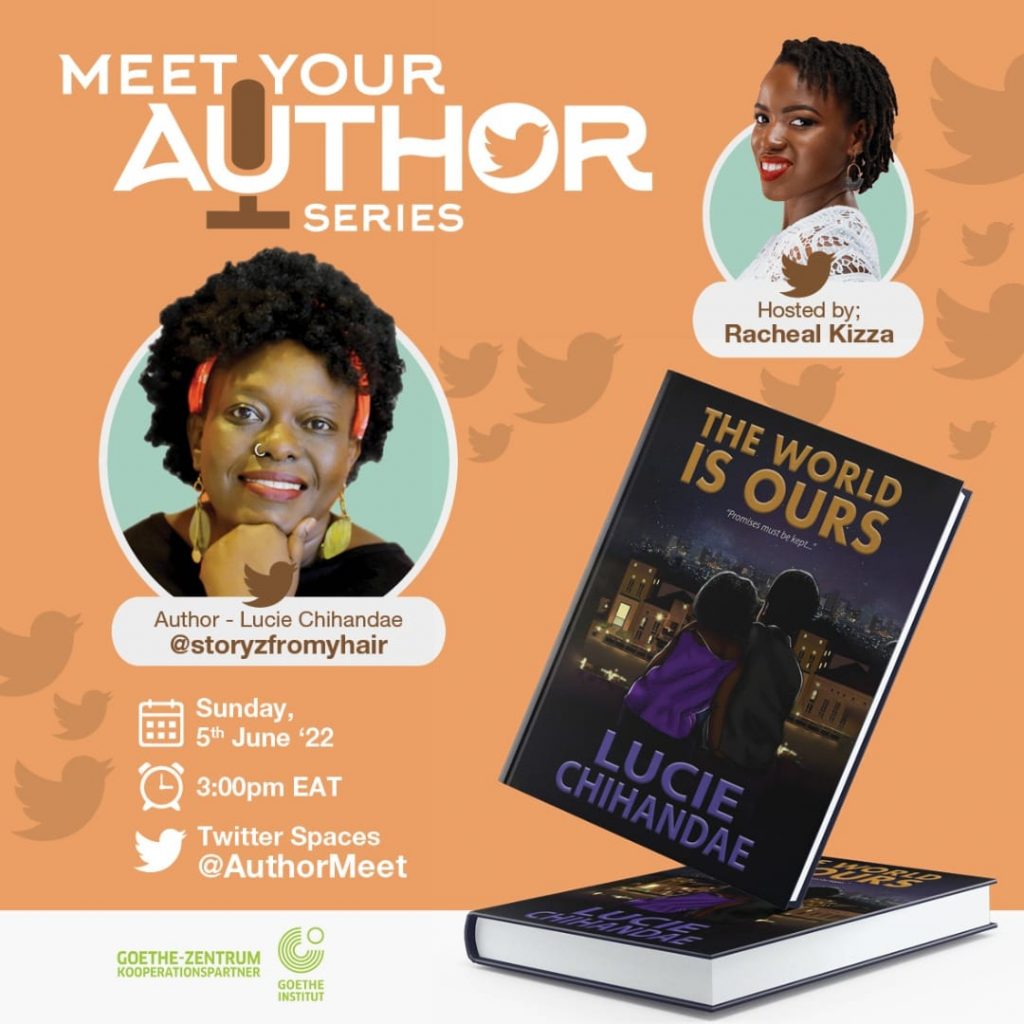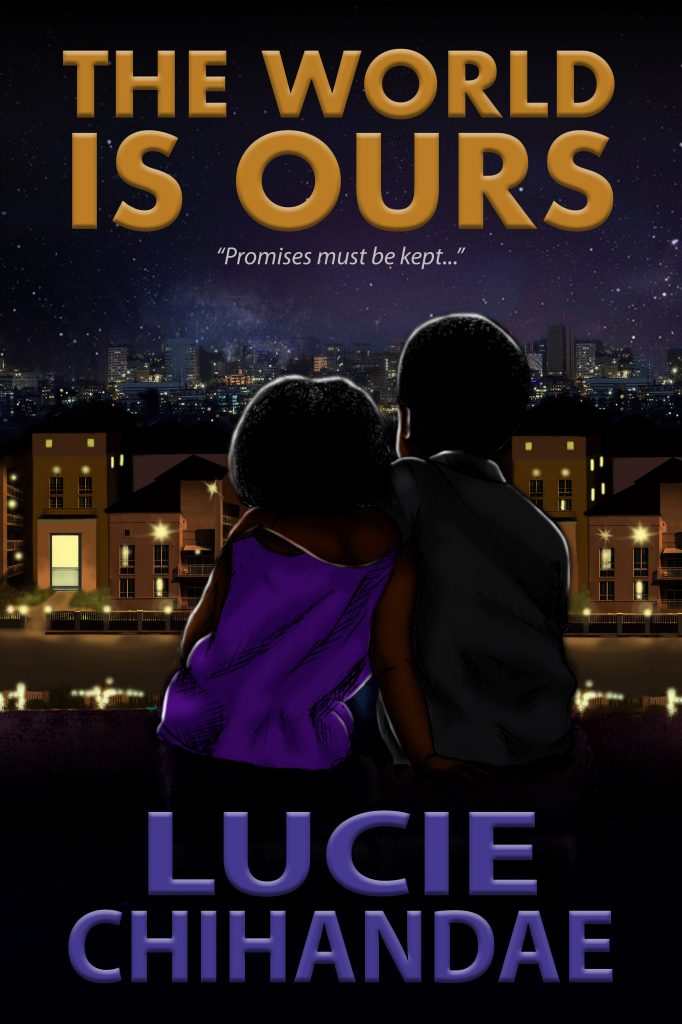
Lucie Chihandae is a storyteller and journalist with over 13 years of experience. She is also a podcaster and runs 2Sistars a media business that she and her sister co-founded to embrace their literary prowess and provide services to the black and African sub-Saharan community.
She has freelanced throughout the twelve years of her writing career working with magazines like African Woman, The New Vision, Sunday Vision, Monitor New Paper, Spice and Secrets Magazine, Bride and Groom and Flair Magazine.
I hosted Lucie in conversation on Twitter Spaces and we discussed her debut novel, The World Is Ours, dominion and her writing process. I also reviewed The World is Ours here.

Racheal Kizza (Racheal): What is The World Is Ours about?
Lucie Chihandae (Lucie): Ah that question …hmm…The World is Ours (TWIO) is an adventure romance novel that takes place in four different countries (highlights three others) in a 30-year time period; it’s a story about doing all it takes to keep promises to those you make them.
On the flip side, it’s a story about a girl and a boy but it’s also about the journey to greatness, the hard work, fortune or the unseen hand that orchestrates destiny, the laser focus through trauma, pain, separation and discovery.
Racheal: What was the writing process like? Did you write everything at once? Did you attend residencies in order to complete the book?
Lucie: Writing process- I wrote TWIO on and off for about eight years. The process was unintentional at times because as a writer our world usually becomes a part of our stories, I absorbed stories of others in byte-size portions, merged it with imagination and loads of research (this involved reading, googling, YouTube and reaching out to people about different things), also digging into my own life archives and sprinkling those pieces of unfinished stories with the rest…and voila!
Did I write it all at once- Nope, not at all, a book that massive needs to marinate now and again and that’s what happened. I wrote a scene where Kevin and Shenzi are on their rooftop dreaming big after a horrible day for them both in 2007 on my blog; in 2011, I entered it into a competition and when it did not make the cut, my older sister encouraged me to flesh it out into a book. I wasn’t sure what it would be but I chewed on it and had a brainstorming session with my little sister, and the broad strokes of the story formed then.
In 2013 I attempted to start at the rooftop scene and got stuck, it felt out of my depth, and I suddenly got the feeling it was going to be a tome, which it is. Massive!
So I attempted at the point where the children are grown up but 10,000 words in it felt like the end and it wasn’t satisfying… So, I was back at the drawing board and in 2018, I decided to start the story ‘before the children’. It was easy, it was exciting writing book one and I enjoyed all the research I did and everything I learned not just about writing but about cultures and about being meticulous with loopholes in a story and how not to gloss over the tiny details etc. Then I skipped over to the children and got tired, battled between interchanging Kevin and Shenzi’s story throughout to the end… got cold feet mid-2018 when I got to writing Kevin’s portion, so skipped to the end portion, procrastinated that middle till 2019 when I pulled myself together got more research done and cried in relief when I put ‘the end’ on the manuscript on 2nd September 2019!
Also, recently I realized this story had always been with me much longer than the blog entry in 2007… in little pieces. I had different portions of it written almost ten years prior the eight years as full short stories, I guess I was meant to write this novel after all.
And nope with no residencies attended even though I applied to several for years.
Racheal: Did you have beta readers on board? At what stage did you involve them? Are beta readers important to the writer?
Lucie: I had read somewhere that the beta reader stage was optional. Although it is quite necessary if you could send out the Review copies to as many close friends, colleagues, readers, editors and professors as possible.
The Review copy should be 90% ready for print, their input adds some minimal corrections, not massive changes. Also, I had to prepare myself for the fact that of the fifty I sent the book to only a few would actually read and give feedback.
So Yes, I did have beta readers whose reviews and comments were very insightful seeing it from their perspective. Some helped with accuracy in the manuscript, others with the flow, authenticity etc. It was the feedback I really needed. And they came at the end, right before I handed it over to the proofreader for a final polish and then print.
I think every writer needs beta readers to ground your story with helpful criticism. They become the sounding board. If they say something isn’t clear to them then take a second look coz it could be unclear to many other readers. It’s important to have people who can give you a fresh look at your book without bias before you get it out there.

Racheal: What was the editing process like? How many editors did you involve? How important is it for writers to work with an editor?
Lucie: When the book was done it was just my sister and me for a whole year and a half. I had been reading everything I could on what to do now that I had a first draft and thanks to google and different writing groups, I went through my manuscript thrice before involving my older sister as an editor and with her, we did it twice, between work, sickness, family commitment and all (loads of work, I tell you phew!) Had rewrites, parts cut out, the book torn apart then put together.
Editing was gruelling. My sister was unforgiving, and I am thankful for that because she was the whole package as an editor; she fact-checked, she was a ‘sensitive editor’ a copy editor, a line editor and the chief editor all in one. When she said, ‘let’s do it again,’ I wanted to cry because I was sick of this book already. However, that’s what the editing process is like and for other people fortunate enough to pay editors, they will need different categories of editors (as listed above) so about five or six people to go through the manuscript. I can’t stress enough how important it is to have an editor but if you plan to write a book, save up for the editorial process because a good editor(s) will determine how well your book makes it out in the market.
However, it was just my sister and I editing, and it also taught me how to be a lot more meticulous and I learned what to look for when editing. Every writer should at least have basic editing knowledge be it punctuation, eliminating glue words, shortening sentences, cutting out repetition; basic…
Racheal: You execute the sex scenes well. How did you achieve that?
Lucie: Great imagination! That and the fact that while writing each of them I was economical in that, each scene was a character development arc for the protagonists, not just soft porn.
I have grown up reading so much romance, it’s crazy. I was thumbing through mills and boons at age 11. Hundreds of romance novels and four years later, I was over the romance novel phase.
Also, I did go through a phase in my life around 18-20 years when I would have these profound conversations with God about things and I recall having that ‘love and sex talk’ impressed on me. It was very enlightening, and the understanding of sex and love was much more profound to me than when I experienced it later. So, when I write about love/sex, I revert to that revelation that was imprinted in my soul so many years ago.
Racheal: Did you have a particular playlist as you worked on this book?
Lucie: Not really although there were songs that came to me when I would think of different scenes in the book. Especially the love between Kevin and Kenzi ( I wanted to write a story about a love so profound it touched any reader) So I remember humming a lot to ‘Against the World’ by V Rose and Flame (the book was first called You and Me against the World.)
Crush by Yuna and Usher, No air by Chris Brown ft Jordin Sparks, Superhuman by Chris Brown ft Keri Hilson and Desert Rose by Sting.
Racheal: What books did you read while writing this book?
Lucie: I had read Ken Follet’s Pillars of the earth in 2019 and I was so so wowed at the multiple protagonist viewpoints he wrote in the story. It was a complex book with a story that occurred in about 80 years or probably a century in the early 10th century. It was a book about building cathedrals and then some.
This story inspired me to keep going because It’s 1,090 pages long. A TOME! It’s got like ten protagonists! Imagine those viewpoints. It’s written in a historical time unlived by the author. He writes about something he had no clue about and everyone including his agent told him to drop it, but the story clung to him. He took nine years to write it. It became a best seller!
Some books I mentally referred to were Americanah by Chimamanda Ngozi Adichie because it was sort of similar with two people who were close once, but time separated them and now she was returning. I could almost tell which portion Chimamanda enjoyed writing the most.
Sidney Sheldon’s Master of the Game and Sands of Time were on my mind too for the story structure, genre; adventure, romance, saga and fascinating page-turner pace it reads.
While I wrote TWIO, I kept asking myself what these great writers would do, each time I hit a snag… all the time!
Racheal: The book is well-researched in terms of the social, political and economic climate. How did you achieve the research? Did you visit all the places mentioned in the book?
Lucie: Hmmmm I feel privileged to have lived in the late ’80s and 90’s in a reading family, we read great writers and I was forced to read larger books much younger so by 12 or 13 I was deeply engrossed in a Sydney or Danielle Steele or Harold Robbins. I was fascinated by writers who globe trotted in their books like they had lived in all these places.
I worked as a journalist for seven years and still consider myself such so research is embedded in the fabric of my career and being. I have always been curious about other cultures and peoples and history.
Again, inspired by books by Ken Follett who is a journalist, I decided I wanted my book immersed in real-world events to give it an authentic feel. I outlined the events, activities and places and threw myself into seeking out people, gathering information via interviews, on youtube, googling research papers, and reaching out to locals and friends of these different cultures and places. I had visited some places in the past and simply spoke to people I knew living in other places.
Also as a writer, throughout your life, you absorb information and eventually it becomes a useful piece rudder that guides your story, so there were many friends and people I had interacted with throughout my career and in moving to the United States; all very colourful experiences in my life’s archives and they became useful… a little portion here and there with a smidgen of my imagination and in-depth research. There were also some pieces of information that literally came to me. Like when I was stuck about mining in Congo, I interacted with actual mineral miners who gave me a 101 course in it. It was a lot of information to absorb.
Street life in Kampala was a merger of imagination, a tiny bit of ‘Slam Dog millionaire’, a famous Ugandan artist’s street life experience and a most engaging undercover investigation I read back in 1995 about a journalist who slept on the streets for a week!
And then, believe it or not, I played a lot of guessing games with pieces I could not access and when I did access them, they were almost 90% accurate!
The meaning of research evolved for me because I realized information and material can be both intentional and unexpected and a lot of it can be weaved from our colourful lives.
Racheal: What is your creative process like?
Lucie: Stories are sacred, a writer is a creator. I like to believe that stories that come to me were long since written (already existed ) and I am only manifesting them.
When a story comes to me it’s usually faint, just a fleeting idea. There are some I have let go and there are those I have scribbled down. Just a line about what it could be about.
Then I start to flesh it out… not so much on paper…although, for scenes that come to me vividly, I will write them out in detail. But I mull over the story. It’s in the back of my mind, on the tip of my tongue, at my fingertips when it grazes a pen. I let it consume me. It’s like coaxing a shy creature from hiding. I must call to the story, it’s a delicate thing. It’s so alive to me because it speaks to me and when I write it, it tends to have a mind of its own, a will of its own which fascinates me when I see the direction it takes against my better judgement.
So, after mulling and drawing it out. I scribble notes (I have a gazillion notepads) I also use charts and dress the characters in them, scenes, settings… an evidence board, so to speak and I surround myself with these scribblings because it draws the story close. The characters gain bodies, faces, and voices, and I speak to them, them to me and to each other while I watch them. They become a part of my life. I imagine them in everyday scenarios anywhere I am. If they are not real to me, it’s hard to write about them. With that done, I am then able to start writing the story.
Racheal: Tips for writers who want to self-publish.
Lucie:
-Research all you can about self-publishing and decide if it’s the direction you want to take.
-Know that it will cost you and don’t be tight-fisted on the most important parts like editing and proofreading.
-Join a writers’ network so you have support and accountability.
-Invest in a laptop, notepads, a good phone with a voice recorder, a writing programme like reedsy.com (which is free) Grammarly, pro-writing aid, scrivener etc.
-If writing anything that’s got real-life adaptations make sure you legally check that it won’t cost you in the long run. For example, it’s illegal to write any part of song lyrics without getting approval from the distributor to do so.
-Find a good distributor and read up on all the distribution out there.
-Find a good self-publishing package that gives you a good paycheck for your story.
-Start marketing at least 8 months before the release date.
-Shop around for an excellent cover designer because a good cover will take you places.
-Don’t worry about a big fancy launch, do what you can with what money you have.
-Just do it!
Racheal: If your life was a series of quotes, which quote (fiction or nonfiction) represents you at this moment?
Lucie: “Life is a series of stories and mine is still being written.”